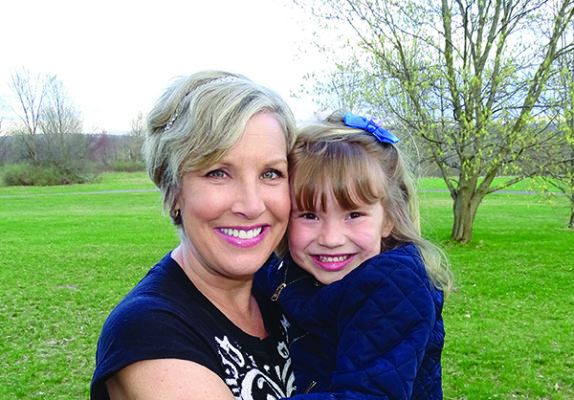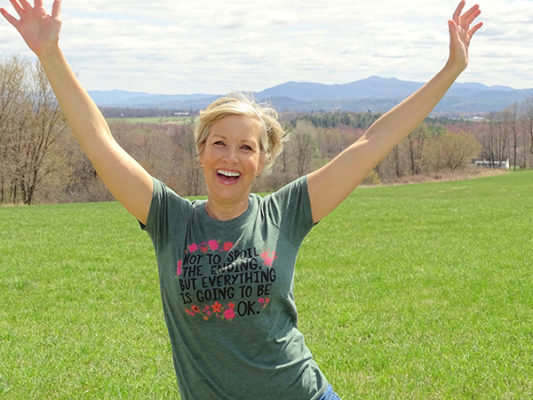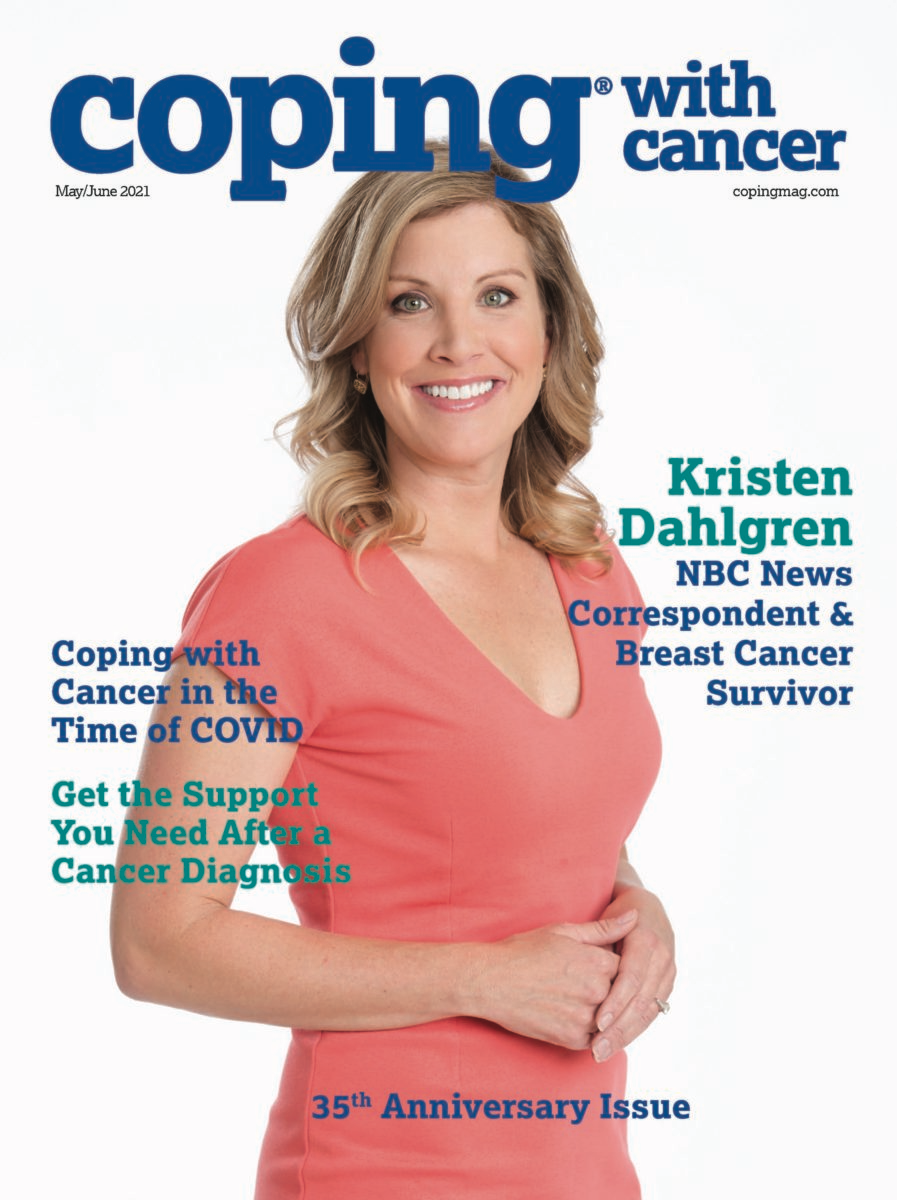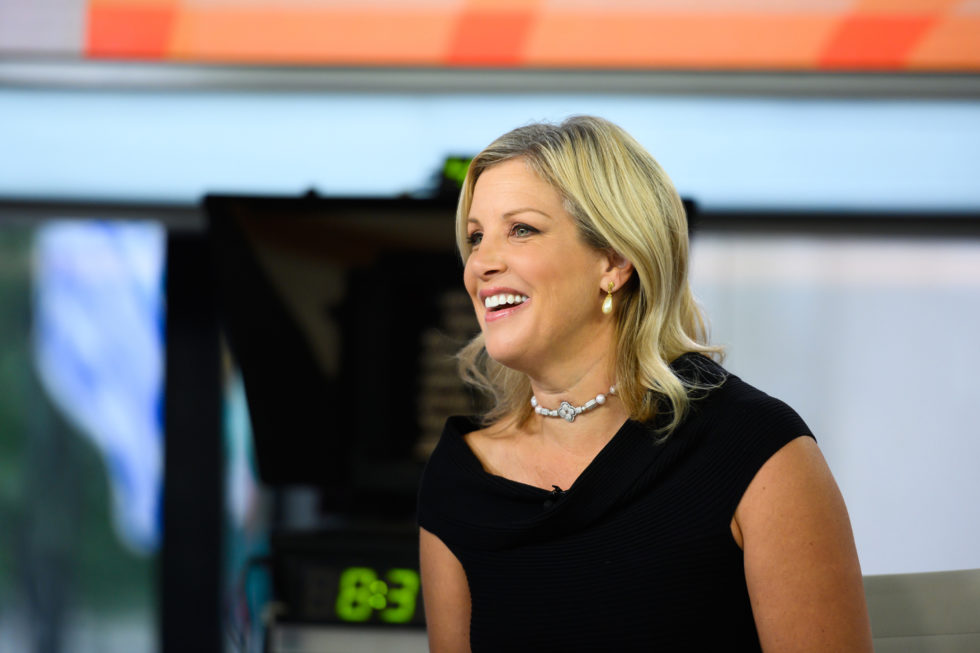NBC News Correspondent Kristen Dahlgren
From Telling Others’ Stories to Sharing Her Own after Being Diagnosed with Breast Cancer
by Ashley Hubbard
It was September 2019, on her 47th birthday, when NBC News correspondent Kristen Dahlgren first noticed something unusual in her right breast.
“I had a screening mammogram in April; it came back negative,” Kristen reveals in an interview with Coping® magazine. “I was just living my life and not thinking about cancer at all.
“I was actually getting ready to go out on my birthday, and I noticed, when I moved my arm, a dent in my breast. I had been lucky enough to do a story a few years prior about how not everyone presents with a lump for breast cancer. So, it struck my eye. I felt it, and it just felt kind of like a thickening. The skin was just different than everywhere else, but it didn’t feel like what I always traditionally thought of cancer, which is like a round hard lump.”
I do feel like I’m still getting great care, but it is really a different experience going through it during the pandemic.
Being diagnosed while on assignment
In true reporter fashion, despite her health concerns, Kristen traveled to the Outer Banks in North Carolina to report on a hurricane. “That’s sort of how my life is – constantly on the go,” Kristen explains.
Hurricane or not, she knew this was something she needed to have checked out – and quickly. Ever resourceful, Kristen called up a local hospital and said, “This is going to sound strange, but is there any way I can get in for a mammogram? I noticed something.”
The nurse suggested that she wait until she got home. But Kristen had a gut feeling and told the nurse, “You know what, I really need to put my mind at ease and get this checked out.”
After a mammogram and ultrasound, Kristen’s doctor called her the following day and told her she needed to get home right away. So, she filed her story for NBC Nightly News, headed to the airport, and was home by morning.
On motherhood and cancer

Kristen has a busy life as a full-time reporter covering assignments around the world, but she didn’t just have herself and her work to think about when she was diagnosed with stage II breast cancer. Kristen also had a three-year-old daughter who was getting ready to start preschool and a stepson who was himself going through cancer treatment.
“I knew I could handle it, but for a three-year-old, I worried that it could be really scary to not understand what is happening,” Kristen says of her young daughter. “Why is mommy losing her hair? Why is she lying on the couch and not able to hold me?”
In addition to worrying about how her daughter would handle her diagnosis, Kristen also had to think about her stepson who was facing his own battle with cancer. He was undergoing treatment for a form of leukemia called acute lymphocytic leukemia. The disease is treatable, but for Kristen’s stepson, it meant three years of chemotherapy.
“I always say it’s easier to go through it yourself than see one of your children go through it,” Kristen says about her stepson’s cancer treatment. “He’s doing well now and is done with treatment, both of us finishing our respective treatments around the same time.
“He was kind of my role model in handling it and tackling it head-on and thriving,” she adds proudly.
A Story for Her Daughter
After she was diagnosed with breast cancer, Kristen wrote a poem to
help her daughter understand what her mommy was going through.
Let me tell you about my Mom.
There’s things you may know.
Right now, my mom is just as brave
as any superhero.
It’s not like when we play dress up –
princess or ballet dancer.
No, she’s a real-life warrior
who’s bravely fighting cancer.
That’s a thing inside her body that’s
not supposed to be there.
The medicine can make her tired …
and it took all her hair.
It’s not my fault. I can’t catch it.
She told me she’ll be fine.
Her doctors say they’ll get it out.
It just may take some time.
I’m sad when she can’t play with me;
there’s many things I miss.
But there’s one thing that hasn’t changed.
That’s Mommy’s special kiss.
She says kisses and cuddles
start a glow that warms inside
a light so bright the cancer cells
have no place they can hide.
She wears a wig, sometimes a hat …
she looks like a princess.
I think she’s still so beautiful.
I tell her not to stress.
Together, we’ll make sure we fight.
I can help her through.
Because now I know I’m just as brave
as a superhero too!
From telling others’ stories to sharing her own
From the moment she was diagnosed, Kristen knew she would tell her story publicly. After all, it was somebody else sharing their story that helped her know what to look for.
However, as a reporter who’s used to telling others’ stories, Kristen soon realized it wasn’t so easy to share her own. “I’m super private,” she admits. “I don’t share a lot of my personal life on social media or publicly, but it was something that could help people, and so I knew from the beginning I wanted to do it.
“I still cry every time it comes up and I see some of the pictures from that time,” she reflects. “So, it was not easy, but I really hope somebody saw it that needed to and found or got something checked. And that’s why I continue to talk about it anytime anybody asks because, especially now [during the pandemic], people aren’t going to get things checked out. If you see something, you suspect something, please go to your doctor, ask about it, get it checked because time is of the essence in many cases with cancer.”
Going through treatment during COVID-19
Cancer treatment is difficult enough, but Kristen found herself going through it during a global pandemic.
Her treatment began with eight rounds of AC-T, a form of chemotherapy used to treat breast cancer. While it was no walk in the park, Kristen did seem to tolerate it well. She experienced fatigue and some bone pain, but overall, she felt good about how it went and took her hair loss in stride as much as she could. Then, at the end of January 2020, Kristen had a bilateral mastectomy.
“I decided to do the bilateral. It was, for me, just a decision that I didn’t want to have to worry about for the rest of my life,” she explains.
Kristen was still home recovering from surgery when the pandemic began. The next step in her treatment plan was radiation. She felt the effects of the pandemic right away when her radiation was pushed back a couple of weeks.
“It was strange,” Kristen reflects on her 25 rounds of radiation during the pandemic. “We still didn’t know very much about COVID, so I didn’t know what to expect. And I would come home and shower before I saw anyone. I didn’t want to bring anything into the house. It was really when New York City was experiencing a spike in cases, so I was very careful.
“I think all the time of people who are going through chemo or their surgeries now and have to do it alone, and I feel so lucky that I was able to have friends and my husband with me for what I saw as the harder part of my treatment.”
However, there is one important milestone Kristen missed out on because of the pandemic. She, along with so many others this past year, didn’t get to ring the symbolic end-of-treatment bell once she finished active treatment for her cancer, as the medical staff wanted to safeguard against germs being spread by people touching the same rope. Additionally, there were no hugs or high fives from medical staff or fellow survivors. Those small things that make you feel less alone had all disappeared because of the pandemic.
“I didn’t see my radiation oncologist throughout my whole treatment schedule, and so that was also strange,” Kristen elaborates. “I just saw my nurse practitioner [in person] for the first time in a year, as everything had switched to telehealth. I do feel like I’m still getting great care, but it is really a different experience going through it during the pandemic.”
When treatment is done but the journey is far from over
Though Kristen has finished active treatment for breast cancer, her cancer journey still isn’t over. Her post-treatment plan includes breast reconstruction and resensation, which is a surgical technique that helps restore sensation to the breast by reconnecting the nerves during breast reconstruction.
“I try and just continue to hope for the best outcome,” Kristen says. “But I know I have one, more likely two, surgeries ahead. So, it’s going to be more than a year in rebuilding. But I was excited to try the resensation, something that hasn’t been done a lot.

We moved out to the country, and I’m living my best country life, reconnecting with nature and my family […] and it’s my goal to just be surrounded by people I love and help as many people as I can through my work.
“I think I told my story because I really wanted people to know what’s out there and that [resensation] is an option. And that it’s OK to want feeling back. It’s OK to want to feel a little bit more like your old self again. You may never get 100 percent of your feeling back, and you may never feel like you used to, but I think they’re developing surgeries that can help to restore more of that.”
Looking ahead
Thinking back on how she got to where she is today, Kristen says, “I was pre-med when I first went to college and I realized I loved writing. I did an internship at NBC Nightly News with Tom Brokaw. That’s when the journalism bug bit. It’s really nice to be working as a correspondent at the same place where I first interned.” It’s clear that journalism is a career Kristen was destined for, and she has no plan to stop anytime soon. Now in remission from cancer, for Kristen, it’s all about finding balance and remembering what’s important.
“We moved out to the country, and I’m living my best country life, reconnecting with nature and my family,” Kristen says. “I’ve got aging parents that we’re helping to take care of, a preschooler that we’re raising, and it’s my goal to just be surrounded by people I love and help as many people as I can through my work.
“You gotta’ buckle up and enjoy the ride. Life can be a little bit crazy, and it does throw these curveballs at you. But it’s made our family closer and made me really focus on the important things in life. I think that’s the biggest silver lining. And I can hopefully live the rest of my life keeping my eyes on those things.”

Follow Kristen on Twitter: @KristenDahlgren.
This article was published in Coping® with Cancer magazine, May/June 2021.
Cover photo by NBCUniversal.


